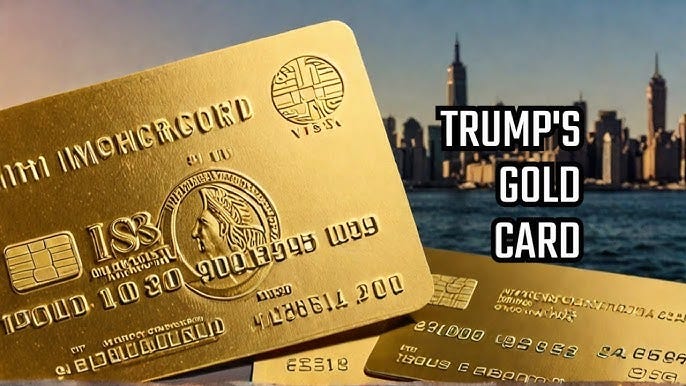Trump’s $5M ‘Gold Card’ Visa: A New Pathway for Wealthy Immigrants Sparks Legal and Economic Debate

The Gold Card Proposal: A Shift in Immigration Policy
In a move that has ignited both curiosity and controversy, former President Donald Trump announced a $5 million “Gold Card” visa program on February 25, 2025. This initiative promises wealthy foreigners a streamlined path to U.S. residency and citizenship. The proposal, unveiled alongside plans for sweeping global tariffs, has sent ripples through financial markets and immigration circles. Questions abound regarding its legality, economic impact, and long-term viability.
This Gold Card initiative aims to replace the decades-old EB-5 investor visa program. Unlike its predecessor, the new program eliminates job creation mandates and allows applicants to secure permanent residency through a direct $5 million payment to the U.S. government. Supporters argue it could inject trillions into the economy. Critics, however, warn of unchecked financial risks and legal hurdles.
Video: CNBC analysis of the Gold Card visa’s potential implications. Source: CNBC
Legal and Economic Challenges
Trump framed the Gold Card as a tool to attract “world-class talent” and offset federal deficits. He claimed the program could generate $5 trillion if one million visas are sold. Commerce Secretary Howard Lutnick likened it to a “transition from job creation to wealth-based immigration,” emphasizing flexibility for investors. Legal experts quickly questioned the proposal’s feasibility. The Immigration and Nationality Act, which governs visa programs, requires Congressional approval for such sweeping changes. This presents a hurdle the administration has yet to address.
Market reactions compounded the uncertainty. The Dow Jones Industrial Average fell 1.2% following the dual announcements of tariffs and the visa overhaul. Analysts cited concerns about trade retaliation and the Gold Card’s opaque implementation. “This isn’t just about immigration policy, it’s a fiscal gamble,” said Robert Frank, CNBC’s wealth editor. “Selling residency like a luxury good might balance budgets short-term, but it ignores systemic labor shortages and security risks.”

Lessons from Abroad: Comparisons to Europe
Comparisons to European “golden visa” programs abound. Nations like Portugal and Spain once offered similar schemes but scaled back due to inflated housing markets and corruption scandals. Greece arrested 12 officials in 2024 for fast-tracking Chinese investors, while Ireland terminated its program after Russian oligarchs exploited loopholes. The Gold Card’s lack of upfront vetting requirements, applicants need only prove they have $5 million, has drawn parallels to these controversies. “We’re repeating Europe’s mistakes,” warned a policy analyst. “Without safeguards, this becomes a fire sale of American sovereignty.”
Economic Opportunities and Concerns
Proponents counter that high-net-worth immigrants could revitalize struggling industries. EB-5 visas funded $6.1 billion in projects between 2022 and 2024, from tech hubs in Austin to renewable energy plants in Nebraska. Yet the Gold Card’s higher price tag and removed job mandates shift focus from community development to pure capital infusion. “This isn’t investment, it’s a transaction,” said immigration attorney Mei Lin, who has filed over 200 EB-5 petitions. “The original program built businesses. Now we’re just selling passports.”
Future Prospects and Legal Challenges
With the Department of Commerce targeting a late March 2025 launch, ambiguity persists. Existing EB-5 applicants face uncertainty, though the 2022 Reform and Integrity Act grandfathers petitions filed before September 2026. Legal challenges seem inevitable: Congress has sole authority to create or eliminate visa categories, and the administration’s executive action claims conflict with decades of precedent. As lawmakers demand clarity, the Gold Card debate underscores a broader divide on immigration’s role in economic growth, and who gets to define it.

